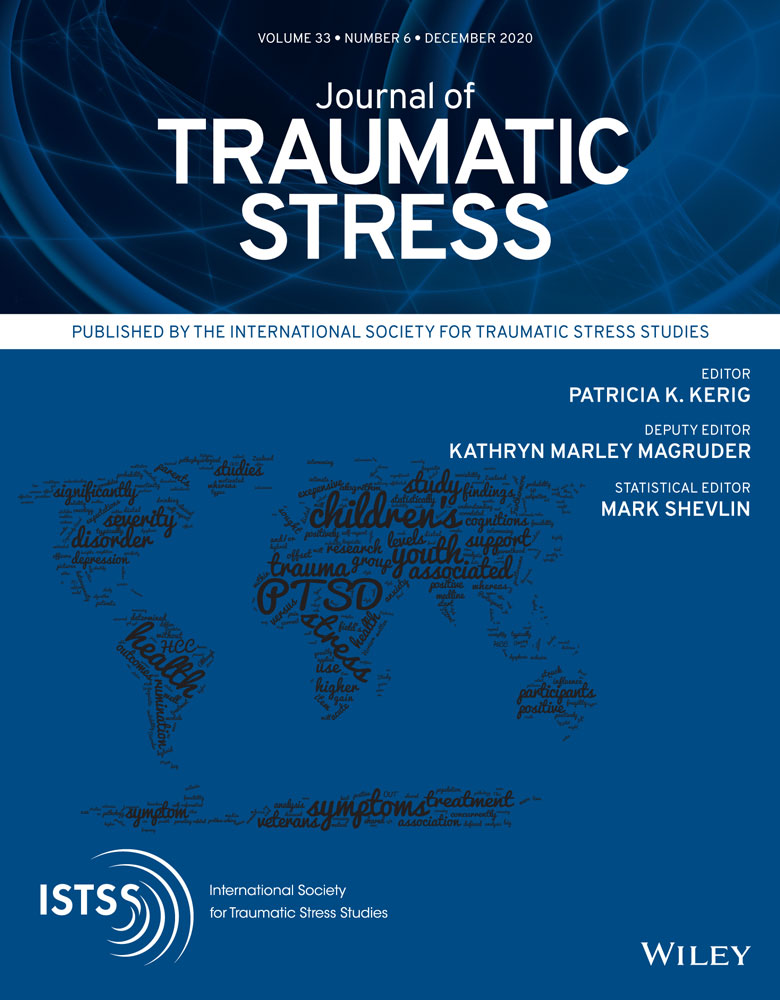Childhood Trauma Exposure Exacerbates the Impact of Concurrent Exposure to Intimate Partner Violence on Women's Posttraumatic Symptoms
This research was supported by the Society for Research in Child Development's Victoria Levin Award and the University of Oregon College of Arts and Sciences.
[Correction added on October 1, 2020, after first online publication: the text “of [BLINDED FOR REVIEW]” is replaced with “at the University of Oregon” in the “Method” section.]
[Correction added on December 7, 2020, after first online publication: the article title is updated from “.... Impact of Concurrent Intimate Partner Violence Exposure on ....” to “.... Impact of Concurrent Exposure to Intimate Partner Violence on ....”.]
Abstract
enAlthough it is well established that intimate partner violence (IPV) is detrimental to women's mental health, it remains unclear to what extent symptoms can be attributed to the proximal effects of IPV exposure itself as opposed to more stable scarring effects or co-occurring risk factors. Heterogeneity in the magnitude of IPV effects further suggests that IPV-exposed individuals are differentially susceptible to disorder, and an investigation of moderating factors that may make women more vulnerable is warranted. We used a prospective longitudinal study of low-income mothers followed from 3 to 18 months postpartum to distinguish the concurrent mental health effects of IPV exposure from overall person-level IPV-mental health associations, as well as to test the moderating role of prior relational traumatic experiences in the form of childhood maltreatment. Multilevel modeling results demonstrated a unique concurrent association between increasing IPV and women's posttraumatic symptoms over time, even after controlling for an overall association between mean IPV and symptom levels. The effects of concurrent IPV were heightened in women who reported a history of childhood maltreatment. Model effects were medium to large, R2 = .27–.35. The implications of these findings for the identification of and intervention with women at the highest risk for relational trauma-related mental health difficulties are discussed.
Resumen
esSpanish Abstracts by Asociación Chilena de Estrés Traumático (ACET)
El trauma infantil exacerba el impacto de la exposición simultánea a la violencia de la pareja íntima en los síntomas del trauma de la mujer
IMPACTO DE LA VPI CONCURRENTE EN LOS SÍNTOMAS POSTRAUMÁTICOS
Aunque está bien establecido que la violencia de pareja íntima (VPI) es perjudicial para la salud mental de las mujeres, no está claro hasta qué punto los síntomas pueden atribuirse a los efectos proximales de la exposición a la VPI en sí misma, en contraposición a los efectos de cicatrización más estables o factores de riesgo concurrentes. La heterogeneidad en la magnitud de los efectos de la VPI sugiere además que las personas expuestas a la VPI son diferencialmente susceptibles al trastorno, y se justifica una investigación de los factores moderadores que pueden hacer a las mujeres más vulnerables. Usamos un estudio longitudinal prospectivo de madres de bajos ingresos seguidas de 3 a 18 meses después del parto para distinguir los efectos concurrentes en la salud mental de la exposición a la VPI de las asociaciones generales de VPI-salud mental a nivel de la persona, así como para probar el papel moderador de experiencias relacionales traumáticas previas en forma de maltrato infantil. Los resultados del modelo multinivel demostraron una asociación simultánea única entre el aumento de la VPI y los síntomas postraumáticos de las mujeres a lo largo del tiempo, incluso después de controlar una asociación general entre la VPI media y los niveles de síntomas. Los efectos de la VPI simultánea se intensificaron en mujeres que informaron antecedentes de maltrato infantil. Los efectos del modelo fueron medianos a grandes, R2 = .27 – .35. Se discuten las implicaciones de estos hallazgos para la identificación e intervención con mujeres con mayor riesgo de dificultades de salud mental asociadas con el trauma relacional.
抽象
zh簡體及繁體中文撮要由亞洲創傷心理研究學會翻譯
JOTS-19-0341.R3 Cintora
Childhood Trauma Exacerbates the Impact of Concurrent Intimate Partner Violence Exposure on Women's Trauma Symptoms
Traditional Chinese
標題: 童年創傷會加劇同時發生的親密關係暴力經歷對女性創傷症狀的影響
撮要: 雖然過往研究早已證實親密關係暴力(IPV)會損害女性的心理健康, 但症狀有多大程度上是從IPV經歷所引伸出來, 而非由更穩定的傷疤效應或其他並存風險因素引致, 這方面仍有待𨤳清。此外, IPV影響在不同個體身上程度不同, 由此可推論出經歷IPV的人出現疾病的機會也會有所差異, 故此有需要檢視有機會令女性進一步受傷害的調節因素。我們透過一項前瞻性縱向研究, 檢視低收入母親分娩後3至18個月
的數據, 從整體個人層面IPV與心理健康的聯繫, 辨識出IPV經歷的同時心理健康效應, 並測試以往的創傷性關係經歷 (童年虐待) 的調節效應。多層次模型顯示, 即使對平均IPV跟症狀水平的整體關連作對照後, 隨時間發展, IPV增加仍跟婦女的創傷後症狀有獨特及並存的關連。童年曾受虐待的女性, 同時發生的IPV效應較強。模型效應量為中等至大型, R2 = .27−.35。我們亦討論到, 是次研究發現有助我們辨識有最高風險有關係創傷相關的心理問題的女性, 並有助我們為這群體提供干預。
Simplified Chinese
标题: 童年创伤会加剧同时发生的亲密关系暴力经历对女性创伤症状的影响
撮要: 虽然过往研究早已证实亲密关系暴力(IPV)会损害女性的心理健康, 但症状有多大程度上是从IPV经历所引伸出来, 而非由更稳定的伤疤效应或其他并存风险因素引致, 这方面仍有待𨤳清。此外, IPV影响在不同个体身上程度不同, 由此可推论出经历IPV的人出现疾病的机会也会有所差异, 故此有需要检视有机会令女性进一步受伤害的调节因素。我们透过一项前瞻性纵向研究, 检视低收入母亲分娩后3至18个月
的数据, 从整体个人层面IPV与心理健康的联系, 辨识出IPV经历的同时心理健康效应, 并测试以往的创伤性关系经历 (童年虐待) 的调节效应。多层次模型显示, 即使对平均IPV跟症状水平的整体关连作对照后, 随时间发展, IPV增加仍跟妇女的创伤后症状有独特及并存的关连。童年曾受虐待的女性, 同时发生的IPV效应较强。模型效应量为中等至大型, R2 = .27−.35。我们亦讨论到, 是次研究发现有助我们辨识有最高风险有关系创伤相关的心理问题的女性, 并有助我们为这群体提供干预。




